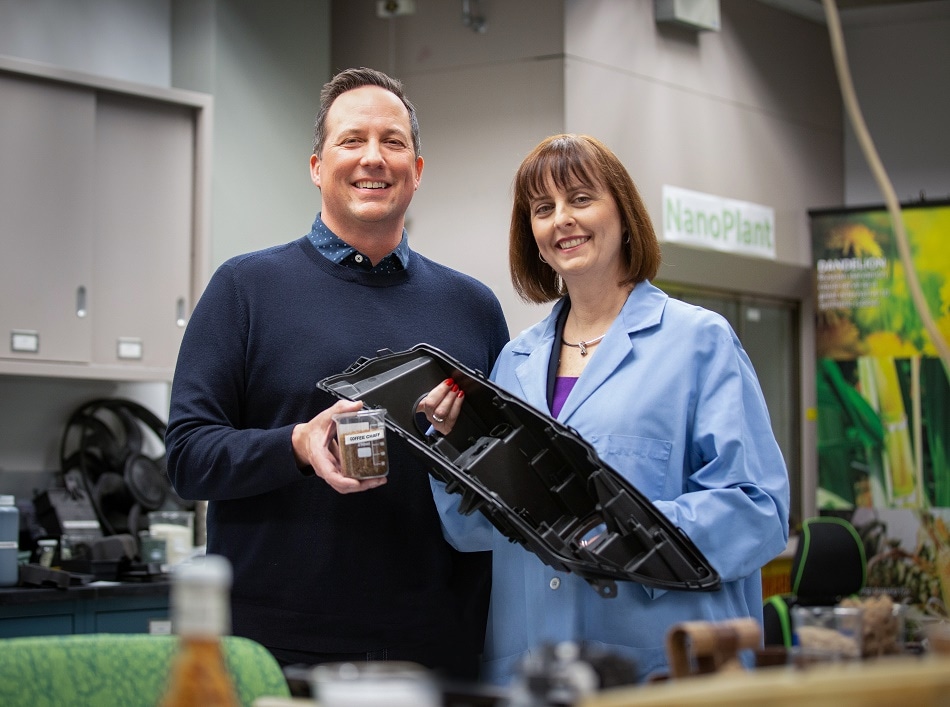
Image Credit: Ford
Ford has announced plans to engineer new bioplastics for car parts using coffee waste supplied by McDonald's in order to help combat the climate crisis. This is a positive step, as the car industry accounts for 9% of greenhouse gases (GHG) produced in 2018, while the transport sector as a whole is responsible for over 25% of total carbon emissions globally.
The partnership sees Ford enter directly into an agreement with the state of California which means the auto-manufacturer would increase the fuel economy of their new fleet of vehicles from now through 2026. In order to achieve their targets Ford will find new and innovative ways to make their vehicles lighter, thus in turn making them more fuel efficient.
Working together with McDonald's, researchers found that the dried skin on coffee beans (coffee chaff) can be transformed into a durable, lightweight material that can then be used for the fabrication of various car parts such as headlamp housing.
This has been a priority for Ford for over 20 years, and this is an example of jump starting the closed-loop economy, where different industries work together and exchange materials that otherwise would be side or waste products.
Debbie Mielewski, Senior Technical Leader, Ford
This collaboration is the latest of Ford’s commitment to using recycled, renewable plastics in their vehicle fleets as well as increasing research and development in other sustainable materials.
What’s more, McDonald's is also continually seeking new ways of minimizing waste and thereby reducing their carbon footprint. “We’re always looking for innovative ways to further that goal,” said Ian Olson, senior director of global sustainability at McDonald’s. Both Ford and McDonald’s stated that a “significant portion” of the coffee chaff – a byproduct from the coffee roasting process – would be converted into bioplastic ready for manufacturing.
To transform the coffee chaff into bioplastic it must first be exposed to high-temperatures in a low-oxygen environment before being mixed with other additives and plastics to form pellets ready for molding. Once the pellets are ready, they can be reheated and fabricated into a wide-range of shapes and sizes for various components on a vehicle. The waste coffee chaff left over from the roasting of McDonald’s coffee beans will then be transported to Competitive Green Technologies, a biomaterials company in Ontario for converting into a bioplastic before being shipped to Varroc, a Ford parts manufacturer.
Ford has said that the chaff composite meets the “quality specifications” for various parts including headlamp housings as well as various other interior and underhood components. Components molded from the coffee chaff bioplastic will be around 20 percent lighter and consume 25 percent less energy during the molding process. This is because of the heat properties of the chaff being, “significantly better than the currently used material,” according to Ford.
The partnership with McDonald's is not the first project of Ford that attempts to incorporate organic, recycled material into the manufacturing process. Ford already produced parts and components from soy, plastic bottles, rice hulls, tomato skins, and even CO2 gas that was captured and converted into a usable material. The company has set a goal to only use recycled and renewable plastics in all of its vehicles worldwide with around 300 car parts from such materials.
Other auto manufacturers that are also attempting to have more eco-friendly production methods include Nissan and BMW. Nissan’s Leaf model is a “zero emissions while driving” vehicle with seats formed from a material made from old polyethylene terephthalate (PET) soda bottles while larger plastic components on the car, such as the dashboard, are also fabricated from a resin made of recycled materials. The BMW i3 is another vehicle with sustainability in mind, as the door panels are made using renewable natural fibers and the wood trim is open-pore eucalyptus certified by the Forest Stewardship Council (FSC).
Ford and McDonald’s are hoping to go one further and set an example for others with how major corporations can work together, innovate and produce new ways to reduce waste and tackle the climate emergency.
Now is the time to jump-start the closed loop economy.
Debbie Mielewski
Disclaimer: The views expressed here are those of the author expressed in their private capacity and do not necessarily represent the views of AZoM.com Limited T/A AZoNetwork the owner and operator of this website. This disclaimer forms part of the Terms and conditions of use of this website.